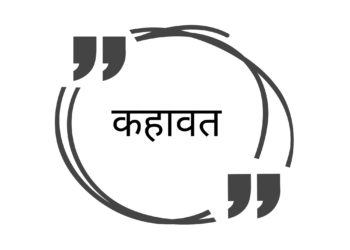Common Hindi Proverbs Posted by Nicole Herbert Dean on Sep 8, 2021 in Hindi Language, Idioms
Every language and culture acquires certain sayings that function as standards for living. Proverbs are as ancient as the Gita and the Bible. You can find chapters on proverbs or wise sayings in these books as well. Hindi does not lack ‘kahavats’ or wise sayings, proverbs that dictate how one should live.
We will look at ten common Hindi proverbs in this post.
घर की मुर्गी दाल बराबर – The actual translation is ‘the house chicken is equal to lentils’. What does this mean in context? It means that what one does not see the value in what is familiar. In other words, familiarity breeds contempt.
अध जल गगरी छलकत जाए – The literal meaning is that a vessel half filled with water will make a noise. In context, it can mean, a man that has half knowledge with talk more than a knowledgeable person. It is similar to the English idiom, ‘Empty vessels make the most noise’.
Borrowing from English
Many of the proverbs are inspired by their English counterparts. However, in Hindi they seem to be more colorful.
अंधों में काना राजा – A king with partial vision among the blind. This proverb means that a man who has partial knowledge or wisdom is considered king or a leader among those who have no knowledge or wisdom.
बन्दर क्या जाने अद्रक का स्वाद – How can a monkey know and appreciate the taste of ginger. This proverb points to ignorance. How can the ignorant appreciate? If one is ignorant they will automatically dismiss things.
दूर के ढ़ोल सुहावने लगते हैं – drums sound better from a distance. Meaning everything looks good from afar. This proverb is similar to the English proverb, ‘The grass is greener on the other side of the fence.’
जो गरजते वोह बरसते नहीं – this proverb is similar to the English saying, ‘His bark is louder than his bite.’ In other words those who threaten rarely take action. The opposite could be true, that those who do not threaten may take action more than those who do.
अब पछताए हो क्या जब चिड़िया चुग गयी खेत – This saying literally translated is, ‘What is the use of repenting when the bird has already eaten the harvest field?’ This proverb is similar to the English proverb, ‘What is the use of crying over spilt milk?’
लोहे के चन्ने चबाना – literally meaning to chew iron pellets. This proverb refers to someone doing an incredibly difficult task. The connotation of working with iron or chewing iron can not only refer to a physical activity but also the acceptance of something that may be difficult.
चलती का नाम गाडी This proverb literally translates as the thing which runs or walks is called a car. This means that if things are running smoothly let it be.
एक म्यान में दो तलवारें नहीं रह सकतीं– literally translated means, two swords cannot fit into the same sheath. What it means is that if two people are alike there will be conflict.

Build vocabulary, practice pronunciation, and more with Transparent Language Online. Available anytime, anywhere, on any device.




